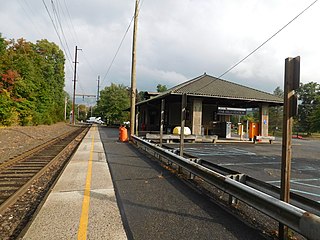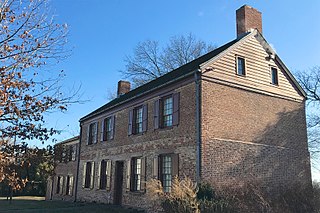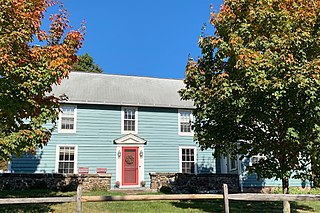
Bernardsville is the northernmost borough in Somerset County, in the U.S. state of New Jersey. Situated within the heart of the Raritan Valley and Somerset Hills regions, the borough is an historic and wealthy bedroom community of New York City in the New York metropolitan area. As of the 2020 United States census, the borough's population was 7,893, an increase of 186 (+2.4%) from the 2010 census count of 7,707, which in turn had reflected an increase of 362 (+4.9%) from the 7,345 counted at the 2000 census. Bernardsville is often mispronounced as "Ber-NARDS-ville" as opposed to the correct pronunciation, "BER-nards-ville".

Morristown National Historical Park is a United States National Historical Park, headquartered in Morristown, New Jersey, consisting of four sites important during the American Revolutionary War: Jockey Hollow, Ford Mansion, Fort Nonsense, and Washington's Headquarters Museum.

Far Hills is a NJ Transit station in Far Hills, in Somerset County, New Jersey, United States located at the intersection of Route 202 and CR 512, one-half mile (0.80 km) east of Route 206.

The Old Dutch Parsonage is a historic house built in 1751, moved about 1913 and now located at 65 Washington Place, in the borough of Somerville in Somerset County, New Jersey, United States. It was added to the National Register of Historic Places on January 25, 1971, for its significance in education and religion. The nomination form notes it as "an excellent example of mid-18th-century Flemish Bond brick structure".

The Wallace House is a Georgian style historic house, which served as the headquarters of General George Washington during the second Middlebrook encampment (1778–79), located at 38 Washington Place, Somerville, Somerset County, New Jersey, United States. It was added to the National Register of Historic Places on December 2, 1970.

The Franklin Inn, also known as the Franklin Inn-Van Liew Homestead, is located at 2371 Amwell Road in East Millstone, New Jersey. The oldest portion of the structure was built as a farmhouse was built by Cornelius Van Liew in 1752. After the American Revolutionary War, the house was known as the Annie Van Liew house, after the daughter of Cornelius who successfully sued the British government for property damage and loss incurred during the war. After the Van Liew family sold the property, the farmhouse was remodeled as a tavern and inn. The Franklin Inn was added to the National Register of Historic Places as a contributing property of the East Millstone Historic District on March 17, 1983.

Bernardsville is a New Jersey Transit station in Bernardsville, Somerset County, New Jersey along the Gladstone Branch of the Morris & Essex Lines, in the United States.

Gladstone is a New Jersey Transit station in Peapack-Gladstone, Somerset County, New Jersey, United States. It is the western terminus of the Gladstone Branch of the Morris and Essex line. A yard is to the east of the station.

The Somerset Hills is known as the northern region of Somerset County located in the central portion of the U.S. state of New Jersey and includes the municipalities of Bedminster, Bernardsville, Bernards Township, Far Hills, and Peapack-Gladstone. The southwestern Morris County municipalities of the Chesters and the Mendhams are periodically recognized as part of the Somerset Hills.

Liberty Corner is an unincorporated community and census-designated place (CDP) located in Bernards Township, in Somerset County, in the U.S. state of New Jersey. Liberty Corner is about 3+3⁄4 miles (6.0 km) south of Bernardsville. Liberty Corner has a post office with ZIP code 07938. The Liberty Corner Historic District was listed on the state and national registers of historic places in 1991.

The Seabrook–Wilson House is located at 119 Port Monmouth Road in the Port Monmouth section of Middletown Township in Monmouth County, New Jersey, United States. The house was added to the National Register of Historic Places on October 29, 1974, for its significance in social history and transportation.

The Lambertville Historic District is a 198-acre (80 ha) historic district encompassing the community centered around the intersection of Route 29 and Route 179 in the city of Lambertville in Hunterdon County, New Jersey, United States. The district was added to the National Register of Historic Places on June 30, 1983, for its significance in architecture, commerce, industry, and settlement. It includes 680 contributing buildings, and two contributing structures.

The General John Frelinghuysen House is a historic building located in Raritan, New Jersey. The older west wing was originally a tavern, built sometime before 1756 by Cornelius Bogert, when it also served as the town's meeting hall. It was bought in 1801 by John Frelinghuysen and then came to be known as the Frelinghuysen Homestead. It is an excellent example of early 19th century Federal architecture in New Jersey. In 1975, it was donated by Peter Frelinghuysen, Jr. to the borough and now serves as the Raritan Public Library.

The Kingston Mill Historic District is a 49-acre (20 ha) historic district in Kingston, New Jersey. It is roughly bounded by the Millstone, River, and Princeton-Kingston Roads in the townships of Princeton in Mercer County, South Brunswick in Middlesex County, and Franklin in Somerset County. It was added to the National Register of Historic Places on April 10, 1986 for its significance in engineering, exploration/settlement, industry, and transportation. The district includes 16 contributing buildings and 2 contributing structures.

The New Jersey Brigade Encampment Site, also called the New Jersey Brigade Area, was used by the Continental Army in the winter of 1779–80, during the American Revolutionary War. The site is located in Bernardsville, Somerset County, New Jersey and extends into Harding Township, Morris County. About 1,300 men of the New Jersey Brigade were encamped here. It is one of four contributing sites of the Morristown National Historical Park. The Cross Estate Gardens property was added in 1975.

The Van Veghten House is a historic building in the Finderne section of Bridgewater Township, New Jersey. It was built around 1725 and served as the headquarters of Quartermaster General Nathanael Greene during the second Middlebrook encampment (1778–79) in the American Revolutionary War. The Somerset County Historical Society owns the house and uses it as its headquarters, including a museum and library. The early 18th-century Old York Road passed by here connecting Philadelphia to New York City. The house was added to the National Register of Historic Places on October 10, 1979 and noted as representing "one of the few remaining Raritan River mansions".

The Van Horne House is a historic building at 941 East Main Street near Bound Brook in Bridgewater Township, Somerset County, New Jersey. The house was built c. 1750 and also known as Phil's Hill, after its owner, Philip Van Horne. It served as the headquarters for American General Benjamin Lincoln in 1777, during the American Revolutionary War, in particular the Battle of Bound Brook. Later, it served as the headquarters for American General William Alexander, Lord Stirling during the second Middlebrook encampment (1778–79). The house, on the early-18th-century Old York Road that connected Philadelphia to New York City, was a New Jersey landmark during the war. Since 2002, the Heritage Trail Association has used the house as its headquarters, including an exhibit space. It was added to the National Register of Historic Places on March 8, 2002, for its locally significant Colonial Revival architecture from 1937 to 1944.

The Jacob Vosseller House is a historic building located at 664 Foothill Road in Bridgewater Township, Somerset County, New Jersey. The house was built c. 1753. It was known as Castner's Tavern, and later Allen's Tavern, during the 19th century. Listed as Vosseller's–Castner's–Allen's Tavern, it was added to the National Register of Historic Places on January 23, 1986, for its significance in architecture, commerce, settlement, and transportation.

Franklin Corners is an unincorporated community located along the Passaic River at the intersection of County Route 613 and U.S. Route 202 in Bernards Township of Somerset County, New Jersey. In the 19th century, it had a grist mill, saw mill, general store, school, and several houses. The Franklin Corners Historic District, featuring Van Dorn's Mill, was listed on the National Register of Historic Places in 1975.

The Reynolds–Scherman House is a historic house located at 71 Hardscrable Road in the borough of Bernardsville in Somerset County, New Jersey. It was added to the National Register of Historic Places on April 29, 1989, for its significance in architecture, industry, and literature.
























